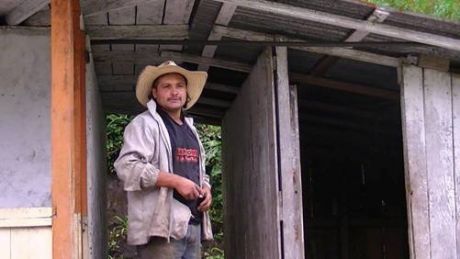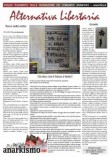|
|
Recent articles by José Antonio Gutiérrez D.
Gustavo Bocanegra fue declarado inocente y absuelto del cargo de rebel... Jul 28 14 “Esto no va a detener la lucha ni voy a encerrarme”. Sobre el atentado... May 18 14 ¿Se preparan acaso 500 órdenes de captura contra organizaciones social... Mar 04 14 The murder of a peasant leader who had opposed the mining project of La Colosa (Cajamarca, Tolima) venezuela / colombia |
repression / prisoners |
opinion / analysis venezuela / colombia |
repression / prisoners |
opinion / analysis
 Thursday November 07, 2013 20:00 Thursday November 07, 2013 20:00 by José Antonio Gutiérrez D. by José Antonio Gutiérrez D.
 In the afternoon of the 2 November, the peasant leader César García, president of the community association (Junta de Acción Comunal) of Cajon La Leona, was killed in cold blood by a shot to the head as he returned to his homestead with his wife and son. García had become visible through his participation in the Environmental and Rural Committee of Cajamarca for the defence of life, water and food (Comité Ambiental y Campesino de Cajamarca por la Defensa de la Vida, el Agua y el Alimento), an organisation which has been leading the community´s struggle against the large-scale extractive project La Colosa. It is key to ask ourselves, who benefits from this crime? Unfortunately we are all too familiar with this situation, where the interests of powerful people are threatened, then “dark forces” arise which plant the seeds of destabilisation, terror, death…after which, in the midst of the onslaught of repression to guarantee “investor security”, the “peacemakers” make their triumphant entry with portfolios brimming with business contracts.
In the afternoon of the 2 November, the peasant leader César García, president of the community association (Junta de Acción Comunal) of Cajon La Leona, was killed in cold blood by a shot to the head as he returned to his homestead with his wife and son [1]. García had become visible through his participation in the Environmental and Rural Committee of Cajamarca for the defence of life, water and food (Comité Ambiental y Campesino de Cajamarca por la Defensa de la Vida, el Agua y el Alimento), an organisation which has been leading the community´s struggle against the large-scale extractive project La Colosa. This open-cast mine has been denounced in Tolima because of the disastrous impact it would have on the community and the environment. The community of Tolima has expressed its rejection of the project through a series of massive demonstrations in defence of water and life, as well as through a popular consultation which took place in the municipality of Piedras on 28 July. On that occasion, 99.2% of the population rejected the mega-mine, with participation of approximately 60% of the electorate [2]. |
Front pagePrisões e mais criminalização marcam o final da Copa do Mundo no Brasil هەڵوێستی سەربەخۆی جەماوەر لە نێوان داعش و & Contra a Copa e a Repressão: Somente a Luta e Organização! Nota Pública de soldariedade e denúncia Uruguay, ante la represión y el abuso policial To vote or not to vote: Should it be a question? Mayday: Building A New Workers Movement Anarchist and international solidarity against Russian State repression Argentina: Atentado y Amenazas contra militantes sociales de la FOB en Rosario, Santa Fe Réponses anarchistes à la crise écologique A verdadeira face da violência! Face à l’antisémitisme, pour l’autodéfense Reflexiones en torno a los libertarios en Chile y la participación electoral Mandela, the ANC and the 1994 Breakthrough: Anarchist / syndicalist reflections Melissa Sepúlveda "Uno de los desafíos más importantes es mostrarnos como una alternativa real" Declaración del FAO ante la coyuntura electoral chilena y el quiebre en el movimiento libertario Venezuela / Colombia | Repression / prisoners | en Thu 07 Aug, 10:35 Note by Bifurcación: This letter is written by two Colombian political prisoners who for some time have become closer to the anarchist struggle. [Castellano] In October 2010 two girls were raped. One of them was killed along with her two little brothers, allegedly by a Colombian soldier in the countryside of a town called Tame, Northeastern Colombia. A prosecutor of the Attorney General's office charged Second Lieutenant Raul Muñoz Linares with the rape and murders. As repression assumes fearful proportions in Colombia, sheer violence is the mechanism to impose a terrorist mafia regime, an enclave subservient to US imperialist interests in the region. The current regime represents the political expression of the harshest class violence against workers in the region. This is not shameful for the Colombian people but it represents a menace to all of the Latin American people. Those libertarian organisations who have signed this statement do so in order to show solidarity with the libertarian movement in Colombia which, along with the rest of the people’s movement, knows no quarter in its struggle against State Terrorism and Imperialism.
We, Grupo Raíces/Grúpa Fréamhacha, condemn the extra-judicial execution of 46 Colombian young men between January and August this year, as emerged on the news two weeks ago. The latest victims of the paramilitary violence are Leonidas Gómez, from a bank employee's trade union; Carmen Cecilla Carvajal, affiliated member of ASINORT trade union; Gildardo Antonio Gómez, affiliated member of ADIDA; Carlos Burbano, affiliated member of the trade union of hospital workers Bogotá -- As usual, this May Day there was a massive demonstration in Bogotá, Colombia. Hundreds of people from a diverse range of social movements took the streets to fight against capitalism. Walking along with the workers, there were a lot of young anarchists that agitated their black flags and shouted for freedom while hearing rock bands in a non-violent attitude.
As examples of the unprecedented criminal violence with which the social protest has been repressed here are the cases of two localities in the department of Tolima: the municipality of Cajamarca and the community of Castilla in the municipality of Coyaima. It must be stressed that these are not exceptional cases, rather two more cases of the officially-endorsed violence against the people that has assailed the whole country.
In Colombia, when investment arrives, repression arrives also. Tolima, in the centre of the country, with innumerable mineral and hydro resources, is becoming an important attraction for both national and transnational capital. The problem is that in the same region there are also peasants who, generation after generation have put down their roots, and who do not want to be forced from their land to facilitate a quarry on the mountains.
For years, the dirty war raging in Colombia has been moving onto the university campuses; students, workers and professors have suffered threats, persecution and murder. Persecution from state agencies has been combined with an orchestrated media campaign to create an atmosphere of hysteria, which reached its climax in the famous videos shown by Gina Parody, an Uribe supporter and senator, and accusations from the director of the Department of Administrative Security (DAS), that accused the organised student movement of being a mere façade of the insurgency. It is not necessary to insist that this atmosphere of collective hysteria is what the state was looking for in order to justify the use of brutal force, that under president Uribe Vélez’s so-called policy of Democratic Security means nothing but the militarisation of all spheres of social life. This is a multifaceted strategy - and has been the typical response of the dominant classes to social protest - in which the repressive actions by both the official institutions and unofficial institutions (ie. Paramilitary gangs) have combined.The collective nature of this document is both a denunciation and a reflection that aims at strengthening the resistance they are trying to suppress, by revealing the mechanisms which are used to advance the institutional and paramilitary intervention in the public universities, and thus to help to advance towards the defeat of this authoritarian project being imposed in Colombia.
As repression assumes fearful proportions in Colombia, sheer violence is the mechanism to impose a terrorist mafia regime, an enclave subservient to US imperialist interests in the region. The current regime represents the political expression of the harshest class violence against workers in the region. This is not shameful for the Colombian people but it represents a menace to all of the Latin American people. Those libertarian organisations who have signed this statement do so in order to show solidarity with the libertarian movement in Colombia which, along with the rest of the people’s movement, knows no quarter in its struggle against State Terrorism and Imperialism.
We, Grupo Raíces/Grúpa Fréamhacha, condemn the extra-judicial execution of 46 Colombian young men between January and August this year, as emerged on the news two weeks ago.
The latest victims of the paramilitary violence are Leonidas Gómez, from a bank employee's trade union; Carmen Cecilla Carvajal, affiliated member of ASINORT trade union; Gildardo Antonio Gómez, affiliated member of ADIDA; Carlos Burbano, affiliated member of the trade union of hospital workers |


 make this your Anarkismo.net front page
make this your Anarkismo.net front page














 printable version
printable version

 Digg this
Digg this del.icio.us
del.icio.us Furl
Furl Reddit
Reddit Technorati
Technorati Facebook
Facebook Twitter
Twitter






